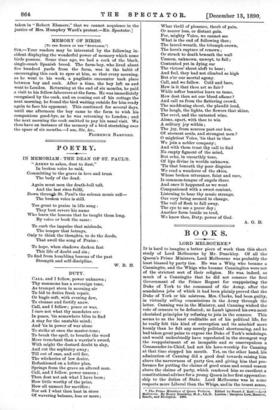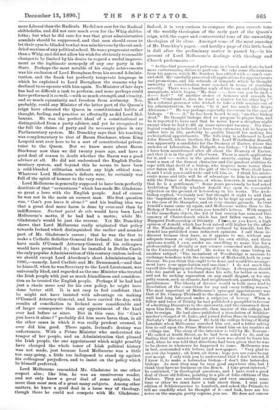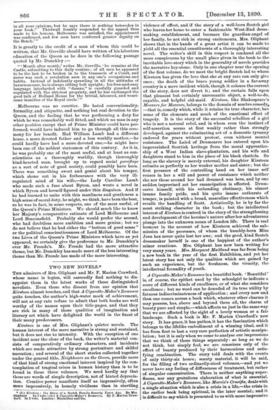BOOKS.
LORD MELBOURNE,*
IT is hard to imagine a better piece of work than this short study of Lord Melbourne by Mr. Dunckley. Of all the Queen's Prime Ministers, Lord Melbourne was probably the least biassed by party ties. He was a Whig who became a Canningite, and the Whigs who became Canningites were not of the strictest sect of their religion. He was, indeed, so much of a Canningite that he did not censure the first Government of the Prince Regent for reappointing the Duke of York to the command of the Army, after the scandalous jobs of which it had been plainly proved that the Duke of York or his mistress, Mrs. Clarke, had been guilty,. in virtually selling commissions in the Army through the latter. Canning was in the Ministry, and Canning wished the vote of censure to be defeated; so Lamb ignored his own most cherished principles by refusing to join in the censure. This seems to us the least creditable act of his political life, for he really felt this kind of corruption and its mischief more keenly than he felt any merely political shortcoming, and he had taken great pains to expose the Duke of York's misdoings, and would undoubtedly have reprobated in the strongest way the reappointment of so incapable and so unscrupulous a Commander-in-Chief, had not his hero-worship for Canning at that time stopped his mouth. Yet, on the other hand, his admiration of Canning did a good deal towards raising him above the narrowness of party ties, and giving him that pre- ference for putting the claims of good sense and sound reason above the claims of party, which rendered him so excellent a constitutional adviser for a young Queen in her first apprentice- ship to the duties of State. Lord Melbourne was in some respects more Liberal than the Whigs, and in the truest sense, • The Prime Ministers of Queen Victoria. Edited by Stuart J. Reid :—Lord Melbourne. By Henry Dnnckley, M.A., LL.D. London : Sampson Low,,Marston, Searle, and Rivington. 1990.
more Liberal than the Radicals. He did not care for the Radical shibboleths, and did not care much even for the Whig shibbo- leths ; but what he did care for was that great administrative scandals should be suppressed, and that men should cease to let their eyes be blinded to what was mischievous by the cut-and- dried maxims of any political school. He was a progressiat rather than a Whig, and did not allow his wish for obviously reasonable -changes to be limited by his desire to regard a useful improve- ment as the legitimate monopoly of any one party in the State. Perhaps the most notable of his single achievements was his exclusion of Lord Brougham from his second Adminis- tration, and the frank but perfectly temperate language in which he explained to Lord Brougham the reasons why he declined to co-operate with him again. No Minister of late days has had so difficult a task to perform, and none perhaps could have performed it so well,—with so much strength and vivacity, and so much equanimity and freedom from acrimony. Nor, probably, could any Minister of the latter part of the Queen's reign have educated the Queen in constitutional habits of thought, feeling, and practice so effectually as did Lord Mel- bourne. He was the perfect ideal of a constitutional as -distinguished from a party adviser, and yet he recognised to the full the claims of party and its necessary place in any Parliamentary system. Mr. Dtmckley says that his teaching was complementary to that of Baron Stockmar, whom King Leopold sent over here to be a sort of constitutional private tutor to the Queen. But we know more about Baron Stockmar now than we did twenty years ago, and have a good deal of reason to doubt whether the Baron was a good adviser at all. He did not understand the English Parlia- mentary system, and beyond this he seems to have been a cold-blooded utilitarian without any high ethical tone. Whatever Lord Melbourne's defects were, he certainly was full of the spirit of honour to the very core.
- Lord Melbourne is generally supposed to have been perfectly destitute of that " earnestness " which has made Mr. Gladstone so great a hero with the English people. And of course he was not in the main an earnest man. His first question was, "Can't you leave it alone ?" and his leading idea was that a great deal more harm is done by over-zeal than by indifference. Surtout point de zele would have been Lord Melbourne's motto, if be had had a motto ; while Mr. Gladstone's would be just the reverse. Yet Mr. Dunckley shows that Lord Melbourne really originated that policy towards Ireland which distinguished the earlier and sounder part of Mr. Gladstone's career ; that he was the first to make a Catholic Solicitor-General for Ireland ; that he would have made O'Connell Attorney-General, if his colleagues would have permitted it ; that he installed in Dublin Castle the only popular Administration of this century (unless, indeed, we should except Lord Aberdeen's short Administration in 1886),—namely, Lord Carlisle and Mr. Drummond,—and that be himself, when he was Secretary to the Lord-Lieutenant, was universally liked, and regarded as the one Minister who treated the Irish people with just as much friendliness and considera- tion as he treated the English people. Perhaps if be had had just a shade more zeal for his own policy, he might have done better still. It is not easy to feel confident that he might not have insisted with advantage on making O'Connell Attorney-General, and have carried the day, with results of conciliation to Ireland more considerable and of larger consequence than any appointment of the kind ever had before or since. But in this ease, his " Can't you leave it alone ?" probably did him more harm than, in all the other cases in which it was really prudent counsel, it ever did him good. There again, Ireland's destiny was unfortunate. With a Prime Minister who understood the temper of her people, and an Administration that pleased the Irish people, the one appointment which might possibly have changed the whole tenor of Irish political history was not made, just because Lord Melbourne was a little too easy-going, a little too indisposed to stand up against his colleagues' prejudices, and to insist on the policy which he himself preferred.
Lord Melbourne resembled Mr. Gladstone in one other respect also ; like him, he was an omnivorous reader, and not only knew a great deal of some subjects, but more than most men of a great many subjects. Among other matters, he knew a good deal in a loose way of theology, though there he could not compete with Mr. Gladstone. Indeed, it is very curious to compare the poco curante tone of the worldly theologian of the early part of the Queen's reign, with the eager and controversial tone of the unworldly theologian of its close. Amongst some of the most amusing of Mr. Dunckley's pages,—and hardly a page of this little book is dull after the preliminary matter is passed by,—is his account of Lord Melbourne's dealings with theology and Church preferments :-
" As the chief purveyor of patronage in Church and State ho had more embarrassing duties to perform. We take some illustrations from his papers, which Mr. Sanders has edited with so much care and skill. He' carefully preserved all applications for appointments and promotions, and his refusals of demands which he thought unworthy of consideration were couched in terms of crushing severity. There was a familiar reply of his to an earl soliciting a marquisate, which began. " My dear —, how can you bo such a d— fool ? " Of another seeker of honours and rewards ho asked, " Confound it, does he want a Garter for his other leg ? " To a colonial governor who wished to take a title reminiscent of his administration, he wrote, " Is it not too much like Scipio Africanus ? " He was perhaps especially irreverent in the case of bishops. " D— it," he has been heard to say, "another bishop dead." He thought bishops died on purpose to plague him, and he is reported to have said that he never knew a sleepless night except when he had to fill up some episcopal vacancy. His theo- logical reading is believed to have been extensive, but ho began it rather late in life, probably to qualify himself for making his ecclesiastical appointments. The following is addressed to Lord John Russell, whose brother, the Rev. Lord Wriothesley Russell, was apparently a candidate for the Deanery of Exeter, whore the arch-foe of Liberalism, Dr. Philpott, was bishop : " I believe that I have been misinformed after all about the Deanery of Exeter, and that it is in the gift of the Crown. There is much application for it, and — writes in the greatest anxiety, saying that they want a man of the firmest character and the greatest abilities to cope with that devil of a bishop, who inspires more terror than over Satan did. If it is in the gift of the Crown Wrio shall have it, and I wish you would write and tell him so. I think his aristo- cratic name and title will be of advantage to him in his contest with the Prince of Darkness, of whom, however, it must be said that he is a gentleman."'• Some years previously he bad asked Archbishop Whately whether Arnold was open to reasonable objection on the ground of heterodoxy in his works. The Arch- bishop replied, 'Certainly not,' but thought it right to add that the imputation of heresy' was likely to be kept up and urged, as in the case of Dr. Hampden, and on very similar grounds. In 1840 Arnold's name came up again, and Melbourne writes thus to the Bishop of Norwich : I return you Arnold's letters. With respect to the immediate object, the Act of last session has annexed this canonry of Christchurch which has just fallen vacant, to the Margaret Professorship of Divinity. I hove, as you know, a high opinion of Arnold, which has been raised still higher by the affair of the Wardenship of Manchester (refused by Arnold), but Dr. Arnold has published some indiscreet opinions. I call them in- discreet because they have, as it appears to me, without any adequate reason or object, impaired his own utility, and these opinions would, I own, render me unwilling to name him for a professorship of divinity or any science connected with divinity, in the University of Oxford.' He writes to the same bishop on another subject : 'The incumbent of Woodbridge is anxious to exchange benefices with the incumbent of Methwold, both in your diocese. Do you think this ought to be done, and would the arrane- ment have your approbation and sanction ? I do not much like myself this chopping and changing of livings. A clergyman should take his parish as a husband does his wife, for better or worse, and not be seeking separation on any small disgust, or for any petty reason, such as climate, bad neighbourhood, quarrelling with parishioners. The liberty of divorce would in both cases lead to dissolution of the connection for any and every trifling reason.' The most important of Melbourne's episcopal appointments was that of Dr. Connop Thirlwall to the diocese of St. David's. Thirl- wall had long laboured under a su4picion of heresy. When a fellow and tutor of Trinity he had published a pamphlet in favour of admitting Dissenters to the university, and the censures it drew upon him from Dr. Wordsworth, then master of the college, led him to resign. He had since published a translation of Schleier- macher's Gospel of St. Luke, and joined Julius Hare in translating Niehuhr's history of Rome.' He held the college living of Kirby Lonsdale when Melbourne searched him out, and a letter asking him to call upon the Prime Minister found him on his rambles at a village inn. The story of the interview is told by Mr. Torrens : called at South Street, as he had been asked to do, and on finding that the minister had not yet riven was about to leave his card, when he was told that directions had been given that he was to be shown in whenever he happened to come. Melbourne was in bed, surrounded with letters and newspapers. " Very glad to see you (he began) ; sit down, sit down ; hope you are come to say you accept. I only wish you to understand that I don't intend, if I know it, to make a heterodox bishop—I don't like heterodox bishops. As men they may be very good anywhere else, but I think they have no business on the Bench. I take great interest," he continued, " in theological questions, and I have read a good deal of those old fellows, pointing to a pile of folio editions of the Fathers. They are excellent reading and very amusing; some time or other we must have a talk about them. I sent your edition of Schleiermacher to Lambeth, and asked the Primate to tell me candidly what he thought of it—and look, here are his notes on the margin. pretty copious, you see. He does not concur
in all your opinions, but he says there is nothing heterodox in your book." Thirlwall frankly responded to the appeal thus made to his honour, Melbourne was satisfied, the appointment was confirmed, and few men have conferred greater dignity on the Bench.' "
It is greatly to the credit of a man of whom this could be written, that Mr. Greville should have written of his laborious
education of the Queen as he does in the following passage quoted by Mr. Dunckley :-
" 'Month after month,' writes Mr. Greville. ' he remains at the Castle, submitting to this daily routine ; of all men he appeared to be the last to be broken in to the trammels of a Court, and never was such a revolution seen in any one's occupations and habits. Instead of indolently sprawling in all the attitudes of luxurious ease, he is always sitting bolt upright ; his free-and-easy language interlarded with "damns," is carefully guarded and regulated with the strictest propriety, and he has exchanged the good talk of Holland House for the trivial, laboured, and weari- some inanities of the Royal circle.' " Melbourne was no courtier. He hated conventionality, formality, and etiquette, and nothing but real devotion to the Queen, and the feeling that he was performing a duty for which he was remarkably well fitted, and which no man in any other position except that of Prime Minister could have per-
formed, would have induced him to go through all this cere- mony for her benefit. Had William Lamb had a different home, a more devoted father and a less worldly mother,—he could hardly have had a more devoted one,—he might have been one of the noblest statesmen of this century. As it is, he was probably one of the most useful, and at least as con- scientious as a thoroughly worldly, though thoroughly kind-hearted man, brought up to regard social persiflage as a sort of note of good society, could possibly have been. There was something sweet and genial about his temper, which shone out in his forbearance with the very ill- regulated mind of his wife,—the Lady Caroline Lamb who made such a fuss about Byron, and wrote a novel in which Byron and herself figured under thin disguises. And if he had learned to unite with this manliness and gentleness a high sense of moral duty, he might, we think, have been the best, as he was in fact, in some respects, one of the most useful, of the Queen's Prime Ministers. We should much like to know her Majesty's comparative estimate of Lord Melbourne and Lord Beaconsfield. Probably she would prefer the second, who had doubtless more ambition and more genius ; but we do not believe that he had either the " bottom of good sense " or the political conscientiousness of Lord Melbourne. Of the two Lives of the Queen's Prime Ministers which have as yet appeared, we certainly give the preference to Mr. Dunckley's over Mr. Fronde's. Mr. Fronde had the more attractive theme, but Mr. Dunckley has made more of the less interesting theme than Mr. Fronde has made of the more interesting.












































 Previous page
Previous page